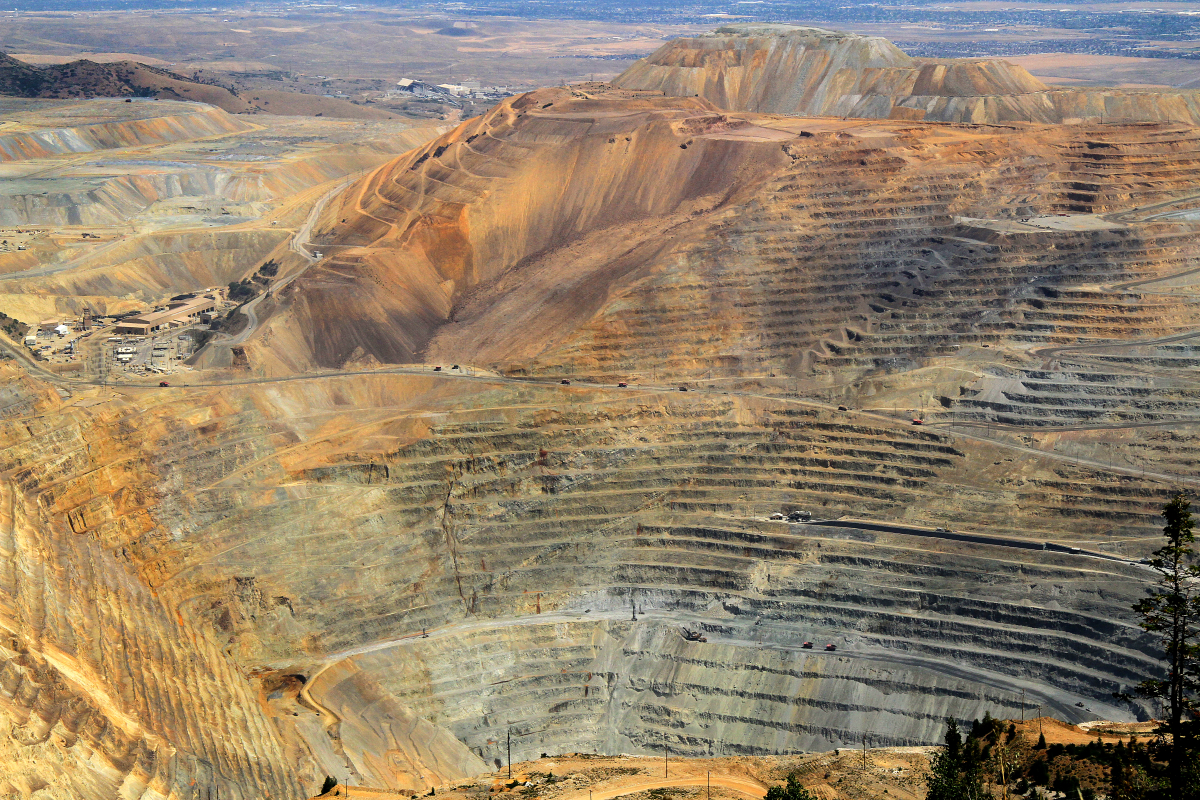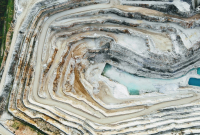Thank you for helping us meet our fundraising goal!
As the world inevitably transitions away from fossil fuel extraction, there’s a growing international consensus that mining critical minerals — including copper, nickel, cobalt, zinc and more — will have to ramp up in order to power clean energy sources.
This consensus, reflected in the 2022 Canadian Critical Minerals Strategy, rests on the assumption that our lifestyles in the developed world are sustainable, if only we stopped pumping CO2 into the atmosphere while commuting from the suburbs in our personal vehicles to work. But given that mining for raw minerals is beset by many of the same problems as fossil fuel extraction — from water pollution to violating Indigenous rights and facilitating violent, exploitative relations with the Global South — I contend this assumption is faulty.
Some degree of mining, naturally, will always be a necessity to keep our lights on and computers running. The fundamental question is one of harm reduction — how do we balance the needs of an energy transition with the harsh realities of mining critical minerals?
The Liberal government plans on having 100 per cent of vehicles sold by 2035 be electric, with the eventual goal of phasing out combustible engines. Replacing every combustible engine with an electric vehicle is simply not a viable long-term solution to the climate crisis.
Just as a traffic jam is a traffic jam, regardless of the type of engines clogging the road, an energy transition that takes place without considering its effects on the material world is doomed to repeat its failures. What’s needed is a fundamental rethink of the rationale underpinning resource extraction — an attitudinal shift away from the cult of endless growth and consumption.
In doing so, we can learn a valuable lesson from Indigenous communities the world over, who reject the notion that a clean economy can be built through the destruction of their lands and water.
Global Consequences of Extracting Minerals
While increasing mining activities to build electric batteries, solar panels and wind turbines might seem like a no-brainer to those who live in big Canadian cities like Toronto and Vancouver, where three-quarters of the world’s mining companies are based, those who have to deal with the consequences of increased production have a notably different view.
In the Yukon, the First Nation of Na-Cho Nyak Dun is calling for “an immediate halt to all mining activity” on its traditional territory after a major rockslide from the Eagle gold mine likely released cyanide into its waters.
Indigenous Peoples and environmentalists have played a leading role in opposing the expansion of mining in Ecuador, which has corrupted pristine, biodiverse lands that are central to Indigenous ways of life. In February, the Shuar Arutam People of Ecuador took Vancouver-based Solaris Resources to the B.C. Securities Commission for allegedly failing to disclose to shareholders that it received consent from just two of 47 Shuar communities for its proposed Warintza mine in the Amazon.
In Sudan, proceeds from gold mining have bankrolled the country’s brutal civil war, which has displaced 7.3 million people and killed thousands since April 2023.
Authorities in the Democratic Republic of the Congo have destroyed homes, villages and agricultural land, and engaged in human rights abuses including sexual violence, beatings and arson to make way for expanded cobalt and copper mining, according to a report last year from Amnesty International.
The products of this violence and environmental degradation in the Global South fuel our modern, tech-infused lifestyle in the Global North, which is bad for the environment, Indigenous reconciliation and international human rights.
But under the existing framework of endless growth, it is, more or less, a necessity. Precious metals aren’t going to mine themselves.
Solutions and Alternatives
There are, of course, alternatives to this global rush for critical minerals.
One option is to slow down the pursuit of economic growth, ensuring an appropriate international regulatory regime is in place to mitigate the worst abuses of mining companies and their government enablers.
A good starting point might be the elimination of the investor-state dispute settlement process, through which extractive companies, including Canadian ones, have strong-armed developing countries into paying them billions in compensation for implementing policies that impact their profit margins.
A more radical proposition is to dispose of the concept of growth altogether.
The word degrowth might be jarring to some, who read it as a call for austerity — a sign of how deeply embedded assumptions about the need for constant economic growth are in our collective consciousness — but it’s provocative by design.
French economist Serge Latouche, writing in Le monde Diplomatique, says the purpose of degrowth is “not a concrete project but a keyword,” which challenges the “tyranny [that] has made imaginative thinking outside the box impossible.
“What really matters is that we reject continuing destruction in the name of development,” he added.
At its core, degrowth proposes a decline in wasteful energy and material consumption habits, with decisions about resource allocation made via local participatory democracy instead of the whims of a global capitalist class. It’s about replacing an economics of “desire” with one of “need,” in which ecological and social values are placed at the forefront of allocating resources.
Indigenous relations of reciprocity between the people and the land, in which people take what they need from each other and nature, and give back what they can, provides a useful framework for degrowth economics.
A degrowth economy would build cities efficiently, rather than in ways that enrich developers; protect green spaces, mountains and waterways; transform investor-owned vacant housing into affordable housing; end health-care privatization; make higher education accessible to anyone who yearns to learn; and promote diplomacy in global conflict.
Degrowth ideals offer an on-ramp towards a better green world that doesn’t simply halt increasing global temperatures while reproducing the inequities of the climate crisis, creating instead a truly just global energy transition.
Jeremy Appel is an independent Edmonton-based journalist and author of Kenneyism: Jason Kenney's Pursuit of Power (Dundurn, 2024). He also writes The Orchard newsletter on Substack, which focuses on the intersection of politics, media and corporate power.
A previous version of this article included gold on the list of critical minerals; it is not currently included on Canada's list.






Comments
Degrowth is a recipe for poverty. The pretense that the wealthy or the upper middle class will transfer a much larger portion of wealth to others (the only way degrowth could work) is pie in the sky nonsense. Something offered up by comfortable Greens who are divorced from reality.
I agree with the premise of the opinion piece- that mining critical minerals for electric vehicles, solar panels etc. will cause more environmental destruction and violate the rights of Indigenous peoples and other people in the Global South. Maybe if everyone living in urban areas could see first hand the destruction that mining can cause, they would be less wasteful with the products they buy. And I agree that we will always need some mining, but we need strict government regulations around it.
Has anyone done the math on this? For example, what amount of minerals is needed to electrify everything and transition away from fossil fuels? And how much ecological destruction will occur if we collectively mine those minerals?
Is degrowth the solution? Who knows? For years there has been discussion regarding steady state economies, economies that don't rely on endless growth and extraction of resources. It hasn't been a very popular idea...
"Has anyone done the math on this?"
I would suggest taking some time to cruise the Rocky Mountain Institute's website and archive of reports. They really have done the math.
I don't recall any economist discussing what a steady state economy would really look like. One can surmise that after a working lifetime of earning an income, paying down debts and building up savings, seniors enjoying their planned retirement will have reached a steady state micro-economy. There are exceptions, but most seniors do not have an overly consumptive lifestyle. That is the point when they'll also be planning how to distribute their assets and gains to their benefactors when they pass off this mortal coil.
My point is, corporate greed and exploitation is a different game and needs to be countered. But those whose living standards are modest and reasonable shouldn't be too phased by the concept of degrowth, which has yet to be defined in detail.
"How do we balance the needs of an energy transition with the harsh realities of mining critical minerals?"
That is a an excellent question. However, the author didn't provide solutions other than some kind of nebulous "degrowth." What is degrowth exactly -- the actual details? How far do we as a society take it before damage is done?
The first part of the question mentions balance. The author did not answer it and disappointingly reverted to reactionary slogans, buzzwords and shaming. But he certainly focussed on the corporate exploitation of Indigenous people in the Global South, too often backed by their governments, all the while ignoring the diverse First Nations support on both sides of the ledger, fossil fuels and transition metals, in their own territories.
And recycling? Closed loop materials cycles? These are the very things that will minimize mining once the market demand has been met. New electric transmission equipment must contain a high percentage of recycled elements, like copper, steel, aluminum etc. etc. etc. That is the only way to manage critical mineral mining while society transitions.
Balance can be thought of as replacement, for example, the replacement of carbon with electricity. That does not automatically translate to a one-to-one replacement of internal combustion engines with electric motors. All it takes is about 30%-50% replacement to permanently destroy enough demand for fossil fuels to force change to a petro economy. Enter the lowly city bus and intercity trains.
The author calls for urban efficacy then immediately launches into a narrative that lumps thousands of development companies into one basket. Is there someone else out there building our cities? Do city councils have development wings full of construction workers building housing? Private developers can and often do try to influence councils, but then again many councils and mayors bring in new rules for rentals (vs. condos), for example, or energy efficiency, or non-fossil energy infrastructure that most developers hate and moan about, but understand that they are all treated equally under the same rules. What on Earth does the author actually know about zoning and transit planning, the public consultation process and the length of time it takes to initiate efficacious urbanism?
And "COMBUSTIBLE" cars? Does he not mean "combustion" cars, or "internal combustion engines"? C'mon. We're supposed to take notions like degrowth seriously in pieces with such misguided references?
If degrowth is an actual process, then please, let's hear from knowledgable economists and planners who can help first define what degrowth actually means and how it can be implemented, mitigated, and remediated to make the transition a success. Leave the activist sloganeering to anti-growth activists who would never admit to their own contribution to emissions and growth, or who do not offer workable solutions as an alternative to their rhetoric.
I've been following the degrowth discourse for almost two years now. It's vitally important to keep this discussion going. Nate Hagens' podcast The Great Simplification is a good one for it. Hagens was the keynote for the Environmental Studies Association conference last month. He's believes (as I do) that degowth will happen whether we like it or not and the goal is to bend, not break, the economy. Eric Pineault at UQAM is another one to watch. He gave a keynote on degrowth by zoom at a conference we organized last year. It's here: https://www.youtube.com/watch?v=dq-KfxtfIDc&t=6s
Yes to an economic system that does not require endless growth and destruction. Yes! There are alternatives. See Herman Daly, for instance. And yes, we will not solve climate change by replacing every gas guzzling vehicle with a shiny new electric car. And mining is just about the last thing our beleaguered world needs.
But a couple of comments about this article:
Be careful with putting the onus on First Nations. Yes, their culture has valued giving back, but they are after all human, some ultimately tempted by the pipelines, LNG, logging old growth forests and the wealth it will bring - all of which is being encouraged and bankrolled by industry and governments.
And, of course, it isn't just First Nations who grieve the destruction of the land and water, biodiversity and Place, Home. Take, for instance, the fight against Gina Rinehart, the Australian coal mining magnate, who - in cahoots with the Government of Alberta - is demanding to mine in the precious Eastern Slopes of the Rocky Mountains, against the wishes of most Albertans. The first application was turned down by a fed/prov panel and the GOA was forced into a moratorium, but the application is back, the moratorium broken by Danielle Smith, and Albertans are back in the fight for their health, their water quality and quantity, their air quality, for biodiversity, for their Place of beauty and enjoyment, Home.
People everywhere, especially rural people, love the land, but urban people sometimes don't seem to get it, focusing as they do in their urban enclaves on eschewing a bit of meat, importing their avocados, and flying everywhere, while championing electric cars and turning a blind eye to the unintended consequences. Or, worse yet, cheering on the mining and manufacturing boom, as the National Observer's new reporter recently did, and he is not alone.
A little less "urban vs. rural" generalizing would be welcome. I've lived among city mice and country mice and found that neither has a monopoly on hypocrisy, environmental or otherwise.
Combustible engines?
Good. You caught that too.
Public transit is the preferable option to cars in every respect, not least because of critical mineral and metal constraints and the ecological/social impacts of mining.
"World would need 55 per cent more copper mines to meet EV transition goals: study" (National Post, Jul 11, 2024)
Compared to doing nothing at all, EVs will speed up the energy shift.
Compared to public transit, EVs will slow it down.
If rising demand for metals (e.g. copper, lithium, cobalt, rare earths for magnets) outstrips supply, that will slow the energy shift down. An insufficient supply of metals exacerbated by a rush to buy EVS will create a chokepoint for the entire energy shift.
EVs require 2.5 times more copper than conventional ICE cars (Daniel Yergin, "The New Map, Energy, Climate, and the Clash of Nations", 2020). Per person per mile, the material inputs for cars are far higher than for public transit. Going the EV route increases requirements for (mining and processing of) metals, resources, and energy — potentially creating a large gap between supply and demand as well as multiplying environmental impacts.
"'The basic metal of electrification': Why famed energy analyst Daniel Yergin sees a copper crunch looming" (Financial Post, Jul 14, 2022)